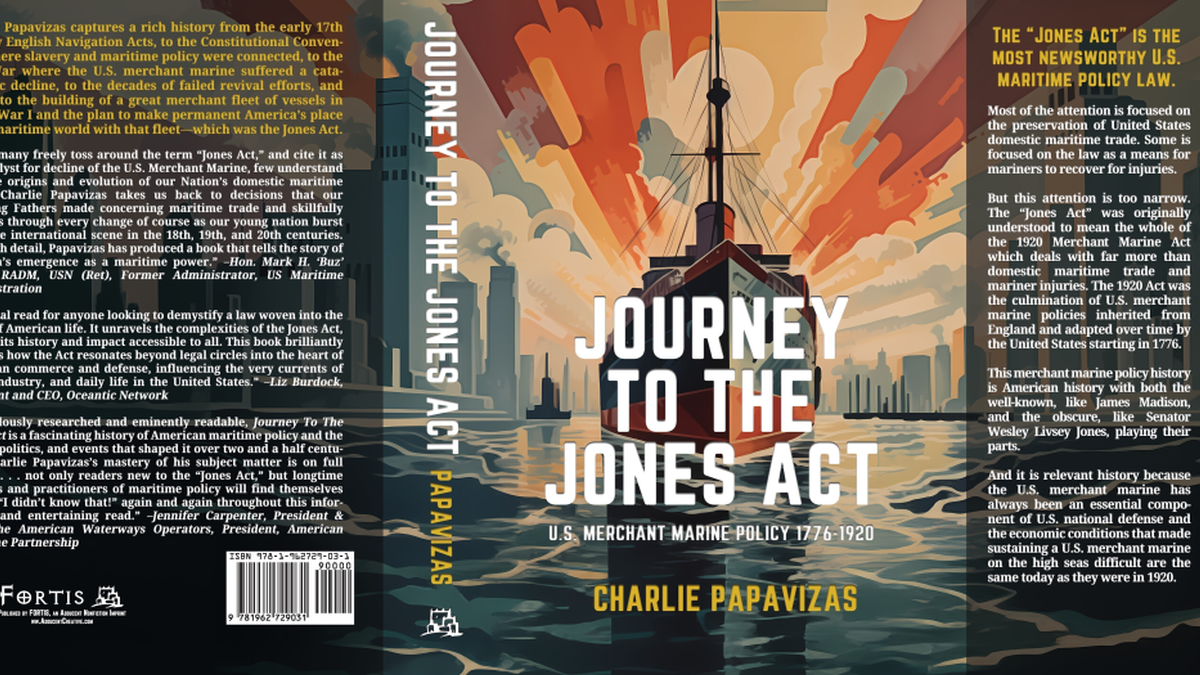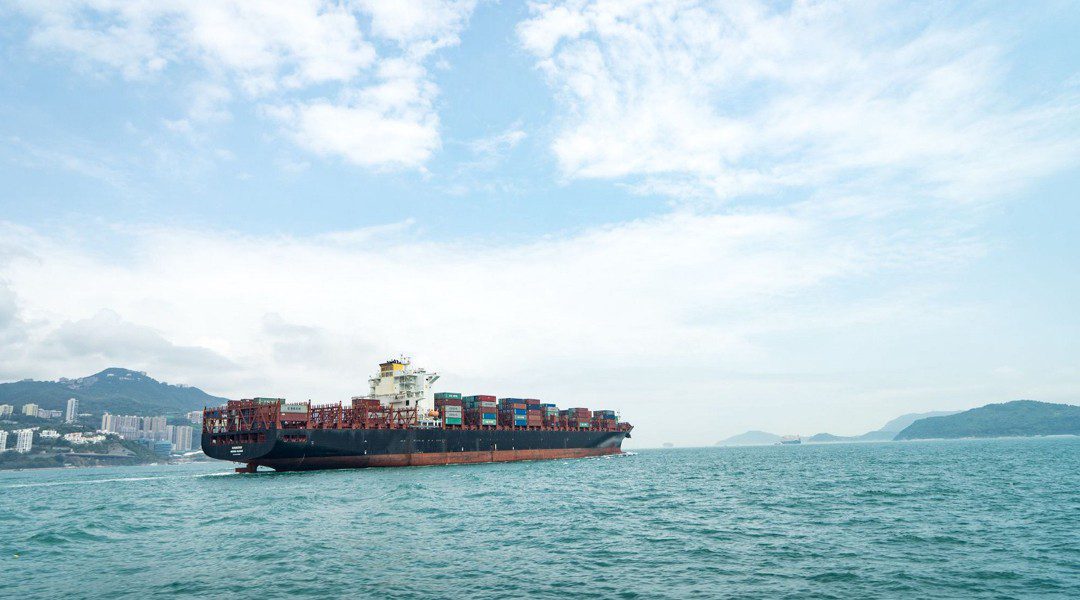 Mr Papavizas’ new book, Journey to the Jones Act, 1776-1920, provides an in-depth look at the history of the Jones Act (source: /Charlie Papavizas)
Mr Papavizas’ new book, Journey to the Jones Act, 1776-1920, provides an in-depth look at the history of the Jones Act (source: /Charlie Papavizas)
A new book, Journey to the Jones Act, 1776-1920, explores the surprising history of US maritime policy and the colourful characters that have shaped America’s cabotage law
When it comes to the Jones Act there is no one more knowledgeable than Charlie Papavizas. An accomplished maritime attorney and partner and maritime practice chair for Winston & Strawn, Mr Papavizas has decades of experience litigating, advising on, blogging about, discussing and debating compliance with the requirements of the Jones Act. His knowledge could fill a book, and now it has.
Mr Papavizas has authored the nearly 600-page Journey to the Jones Act, 1776-1920, which meticulously details the development and history of US maritime policy and the Jones Act from its earliest beginnings.
Taking inspiration in part from the English Navigation Acts of 1651 and 1653, US maritime policy and the Jones Act were shaped by the Founding Fathers, with James Madison, first as a Representative and later as President, taking a starring role. President Madison signed the Act of 1 March 1817, which established the reservation of US coastwise trade to vessels wholly owned by US citizens.
Writes Mr Papavizas, the 1817 Act “did not restrict US domestic trade to US-registered vessels but rather to vessels owned by US citizens, even if they were registered in another country. US-owned, foreign-flag vessels could still participate in US domestic trade upon the payment of a stiff tonnage tax.”
Most industry insiders recognise the Jones Act as the US maritime cabotage law that restricts domestic maritime trade to vessels that operate under the US flag, are crewed with American mariners and built in the US.
“Mr Papavizas achieves the feel of a dynamic historical novel”
But explains Mr Papavizas: “That’s not the Jones Act in 1920. In 1920, the Jones Act was the whole of the merchant marine policy that dealt also with international trade. In fact, mainly with international trade. When Senator Jones was working through Congress, the Merchant Marine Act 1920, of which the Jones Act that we speak of today was only a part. The rest of the law had nothing to do with domestic maritime trade.”
He admits that the title of the book is “a bit of sleight of hand” because Journey to the Jones Act “is really about the whole of the merchant marine policy from the beginning of the United States to 1920 with the intention, by the way, of having to write a second book to bring it current.” But he adds quickly: “Don’t count on that coming out anytime soon. The Jones Act is a maritime law that deals with coastwise trade and is part of the book. It’s just not the whole of the book.”
Mr Papavizas was driven to the write the book, in part, because “the Jones Act clearly had a mythology to it that was not always associated with its reality. And that bothered me to some degree.” He adds: “The other thing that bothered me is how often it’s mischaracterised.”
A recent example, cites Mr Papavizas, is the characterisation that the Jones Act is a “100-year-old law and that it was written into law because of World War I. Both of those statements are wrong. It’s not a 100-year-old law. It’s a law that the US adopted from English tradition and [a] law that goes all the way back essentially to 1789 and to 1817. And what happened in 1920 was just a minor modification.”
While Mr Papavizas did not name the mischaracterising culprit during our interview, it was a clear reference to Senator Mike Lee (R-Utah), who has filed legislation to repeal part of the Jones Act. Calling the Jones Act “antiquated World War I-era regulations”, Senator Lee has introduced two bills this year, the “Open America’s Waters Act” and the “Protecting Access to American Products Act”. The “Open Waters Act” seeks to repeal the cabotage requirements of the Jones Act, allowing all vessels that meet US legal standards to engage in domestic trade between US ports.
A second bill, “Protecting Access to American Products Act”, would establish a framework for waiving certain Jones Act requirements under specified circumstances, such as when no Jones Act-compliant vessel is available to transport goods.
While a book about the historical beginnings of US maritime policy might have been dense and dry, Mr Papavizas achieves the feel of a dynamic historical novel, breathing life into the key players, politics and world events that shaped the Jones Act.
An entire chapter in the book is devoted to Senator Wesley Livsey Jones (R-Washington), the hard-working politician who lends his name to the law and sponsor of the Merchant Marine Act of 1920. Among his other causes, he was a vocal proponent of Prohibition and “very much a moralist, which I thought was useful to bring out,” says Mr Papavizas. During the eulogy at his funeral, Senator Jones was remembered as “the cleanest man I ever knew” by a fellow Congressman who served with him in the House.
Maritime cabotage laws
Maritime cabotage laws like the Jones Act are not unusual. About 80% of the world’s coastlines of UN maritime states have laws reserving maritime trade in domestic coastal waters to local entities, according to a study commissioned by the International Transport Workers’ Federation.
So, why does the Jones Act generate such passionate debate between advocates and critics?
“Like a lot of economic laws, it is a barrier between what people want to do and what they can do, and it has a cost to it,” states Mr Papavizas.
A staunch supporter of the Jones Act, Representative John Garamendi (D-California), has reintroduced “Close Agency Loopholes to the Jones Act” to remove loopholes that allow internationally flagged OSVs and other offshore vessels to “skirt” the Jones Act while supporting offshore energy development in the US.
The legislation and US maritime policy will be discussed in-depth at Riviera Maritime Media’s Offshore Support Journal Conference, Americas, in Houston, 11-12 June 2024. Mr Papavizas will be on hand to present on “The Jones Act and what it means for OSV owners”, as well as joining panellists Lieutenant Commander Daniel Wilkinson, Commanding Officer, Outer Continental Shelf National Center of Expertise, US Coast Guard and OMSA chief executive and president, Aaron Smith, in a regulatory roundtable on offshore oil and gas development in the US Gulf of Mexico.





